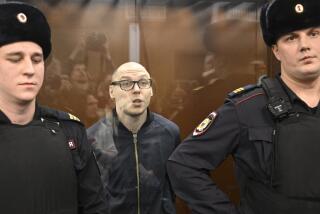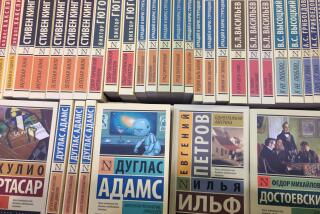Russian Poet Dazzles Emigre Students at Queens College
- Share via
NEW YORK — “It’s like having Shakespeare come back to teach you,” said a student who spent the afternoon studying Russian poetry with Yevgeny Yevtushenko. “It’s like studying physics with Einstein.”
The poet himself, one of the great survivors of Russia’s Communist era, doesn’t put it that grandly.
Having recited verses from memory for nearly three hours in his theatrical baritone--now booming, now whispering, crinkling the deep lines of his ruddy face to put across a particularly good line--he sat down and said: “I am a bad teacher. I forgot to fill the list of attendees.”
Still, hoarse after the class, he was cheered by the idea of a well-earned “big glass of vodka with a beer chaser.”
Yevtushenko enjoyed his reception at Queens College earlier this month, where students a third his age have signed up for Russian-language classes in the 19th-century poet Aleksandr Pushkin and in 20th-century Russian poetry.
Decades ago, Yevtushenko’s controversial comments and daring poems, most famously “Babi Yar,” an indictment of the indifference of the Soviet regime to the Jewish victims of Nazi terror, put him at odds with the Kremlin.
But while poets such as the late Joseph Brodsky were exiled to the far north or Siberia, Yevtushenko enjoyed privileges such as traveling abroad.
Some sneered at him for never crossing the line to dissidence. But for his students at Queens College, Russian-speaking immigrants from widely scattered parts of the former Soviet Union, all that was long ago.
What mattered now was a chance to study with one of the most famous writers of the age, someone they knew as a master of the Russian tradition of poetry as mass performance art.
His readings were on television, his books were on their parents’ bookshelves, and some were even young enough to have studied his works in the liberalized Russian high schools of the glasnost era. A few middle-aged students remembered him as one of the few outspoken public figures of their youth.
“It was a colossal experience, something to tell your grandchildren about,” said Svetlana Kveyt, 23, who emigrated from Ukraine three years ago.
“It was very difficult to see him in Russia,” said Lev Rutensky, 49, a department store employee who signed up for the course after reading about it in a local newspaper. “All the tickets were sold out.”
It was his wife, Irina, 48, who compared the experience to studying with Shakespeare or Einstein.
For Yevtushenko, who just rented a one-bedroom apartment in the New York borough of Queens, the sight of Russian speakers from the far reaches of the old Soviet empire seemed to evoke a tempered nostalgia for the days when the Russian language ruled across 11 time zones.
But he was careful to say that he would not want to see any newly independent former Soviet republics forced back into Moscow’s embrace against their will.
“The situation is unique,” he said, having polled the students on their birthplaces. “The Soviet Union has fallen apart there, and here it has come back together again. I want to write a poem about it.”
Dressed in a colorful quilted Guatemalan sweater, Yevtushenko whipped a pair of reading glasses on and off as he declaimed, sometimes by heart, sometimes referring to his recently published anthology of Russian poetry.
Yevtushenko, who was named a distinguished professor at the Queens campus of the government-funded City University of New York, has signed on to teach another two courses in the fall semester.
He devoted his first class to the works of Brodsky, with whom he had a “complex” relationship--although Brodsky agreed to be included in his anthology--and Yuri Levitansky, who died recently.
More to Read
Sign up for our Book Club newsletter
Get the latest news, events and more from the Los Angeles Times Book Club, and help us get L.A. reading and talking.
You may occasionally receive promotional content from the Los Angeles Times.










